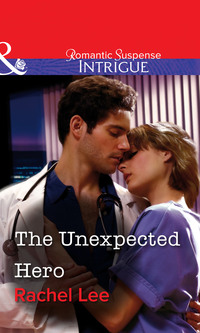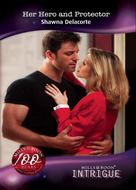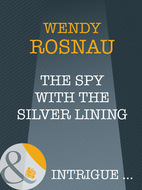Kitap dosya olarak indirilemez ancak uygulamamız üzerinden veya online olarak web sitemizden okunabilir.
Kitabı oku: «The Unexpected Hero»
The Unexpected Hero
Rachel Lee

MILLS & BOON
Before you start reading, why not sign up?
Thank you for downloading this Mills & Boon book. If you want to hear about exclusive discounts, special offers and competitions, sign up to our email newsletter today!
Or simply visit
Mills & Boon emails are completely free to receive and you can unsubscribe at any time via the link in any email we send you.
Table of Contents
Cover
Title Page
Dear Reader
About the Author
Dedication
Chapter One
Chapter Two
Chapter Three
Chapter Four
Chapter Five
Chapter Six
Chapter Seven
Chapter Eight
Chapter Nine
Chapter Ten
Chapter Eleven
Chapter Twelve
Chapter Thirteen
Chapter Fourteen
Copyright
Dear Reader,
The idea for this book was born out of my concern for some unsung heroes. We are aware of our combat vets, and the dangers they face. Too often we forget the people they depend on: the medics, nurses and doctors who face the same risks, the same horrors.
I cannot praise enough the military medical people I’ve known, from medics in the field (now there’s heroism), to those who function in field hospitals that are not always safe from attack. They risk their lives to bring relief and healing. I’ve never known a medic, a nurse or a doctor who didn’t also treat civilian casualties whenever they could.
And then there are the hospital ships. One of our greatest gifts to Indonesia after the tsunami was the presence of a hospital ship. We sent her and her wonderful facilities and staff to help the injured and sick, and many of these medical people ventured ashore, despite warnings that they could be targets of warring factions. These people bear scars, too. People who have devoted themselves to one of the highest callings: saving human lives. And they venture into places willingly where few of us would choose to go. God bless them all.
Rachel
About the Author
RACHEL LEE was hooked on writing by the age of twelve, and practiced her craft as she moved from place to place all over the United States. This New York Times bestselling author now resides in Florida and has the joy of writing full-time. Her bestselling Conard County miniseries (see www.conardcounty.com) has won the hearts of readers worldwide, and it’s no wonder, given her own approach to life and love. As she says, “Life is the biggest romantic adventure of all—and if you’re open and aware, the most marvelous things are just waiting to be discovered.”
To my editor, my agent and the many others
who help bring Conard County to life,
from copy editors to cover artists.
Chapter One
She thought it was going to be a good evening. Finally.
Kristin Tate, known to family and friends as Krissie, stood at the nurses’ station and looked out the window across the corridor at a view of purpling Wyoming mountains to the west as the sun settled for the night. It was, she told herself, good to be home in Conard County.
Six years in the navy followed by eighteen months at the VA hospital in Denver had thoroughly killed any taste she had for the so-called excitement of trauma care. If she lived the rest of her life without ever seeing another human being in that kind of condition, it wouldn’t be long enough.
But tonight, her first night on her new job at Conard County’s community hospital, it felt good to be in scrubs and facing a patient load of ordinary illnesses, and taking care of people who would recover.
A review of the charts assured her she would face no major difficulties: a kid with a broken leg in traction by himself in a room. An older man with phlebitis receiving anticoagulants. She’d need to check him frequently. A woman with congestive heart failure who seemed to be recovering nicely as her fluid retention diminished. A gastritis that should be ready to go home in the morning, along with a dehydration case and a man with diverticulitis on IV antibiotics.
Straightforward, likely totally uncomplicated. An easy night of checking up on patients who were getting better. God, what a relief that was going to be.
Julie and Nancy, the two licensed practical nurses sharing her shift, were off down the corridor, beginning to usher visitors out for the night. Both LPNs seemed nice, if terribly young, and she wondered if they were new to the area, or if she had somehow just forgotten them. It was possible. They would have still been kids when she left for nursing school, well beneath her radar.
And all these thoughts, she realized as she looked at the mountains, were thoughts designed to distract her from the familiar antiseptic smells that could so easily cause her to regurgitate memories of horrors best forgotten.
The sound of rapid footsteps drew her attention down the hall.
A man bore down on the nurses’ station looking a bit like a thundercloud. Dark-haired, dark-eyed, a bit rough around the edges, as if he were too busy to worry about things like haircuts and five o’clock shadow. He wore blue scrubs beneath a white coat. As she watched him approach, she saw her two LPNs glance at each other and dart into separate patient rooms. One of those, she thought, somewhere between amusement and impatience.
“Ms. Tate,” he said peremptorily.
She stiffened a bit at his tone, and scanned his name plate: Dr. David Marcus. She’d heard a new doctor had started since her last visit home, and this must be him. She forced herself to reply pleasantly, “Yes, doctor?”
“Before we begin, I’d like a few words with you.”
Okay, Kristin thought, as she followed him to an empty patient room. One of those. Big ego, martinet, wanting everyone to kowtow just so to him. Well, she’d dealt with that kind before. If he was the only thorn on the rose of this new job, she could handle it.
In the patient room, he tossed down a chart he was carrying on the bed and faced her from the far side. His brows lowered, making him appear angry.
“Close the door,” he said. No please or thank you. Forcing her face to remain empty of expression, she gave the door a quick tug. On its pneumatics, it swung slowly closed behind her.
Then, as a result of years of long training in the navy, she assumed the at-ease position: feet spread, hands clasped behind her back. That was the most she would give him.
“I read your jacket,” he said.
Kristin stared at him, wondering where the devil this was going? She had ample training and experience as a nurse and excellent recommendations. Did he have something against the navy? “Yes, sir?”
“I know about your experience. I know the conditions you practiced under, because I practiced under similar conditions years ago, with the army.”
And this meant?
“Yes, doctor.”
“I want to make it very clear that this is a different kind of medicine we practice here.”
“That’s what I was hoping.” She tried to smile, but her dislike for him was rapidly growing. Kind of sad, because he was actually an attractive man. Not that she wanted to be attracted to any man right now.
“The thing is, Ms. Tate, on severe emergencies, we stabilize and transport. The cases we have here are uncomplicated. They don’t require any extraordinary measures, as a rule, and they don’t require any creative treatment. I know what it’s like in a field hospital and in a trauma center, and I’m telling you right now, you will follow proper protocols at all times, and you will not step outside your legal responsibilities as a nurse.”
That’s when she began to simmer. Really simmer. Part of her wanted to take him on and ask what kind of yahoo he thought she was, what kind of nurse? Instead she kept her voice level. “Nurse practitioner,” she corrected.
“Nurse whatever, I don’t care. Your experience is all wrong for this kind of hospital, and I want you to be aware of it before you make a decision you have no authority to make. I want you to review protocols to re-familiarize yourself with the proper way to practice medicine. Are we clear?”
“Yes, sir!” she said smartly, when what she really wanted to do was crawl across that bed and shake him until his teeth rattled. Who did he think he was? And how dare he make judgments about her when he knew absolutely nothing about her or the way she worked?
“I will be watching you,” he said sternly. “Now let’s go on rounds.”
She followed him, feeling like a dog on an extremely tight leash, waiting for a command to sit or roll over. A nurse didn’t go on rounds with a doctor, didn’t trot after him this way. A nurse was supposed to be treated as a professional who could read a patient’s chart and follow the orders on it, not as someone who needed to be instructed on every step in the treatment plan, certainly not in uncomplicated cases like these.
With the patients, however, he was a different man entirely. Trying to swallow her anger with him, she watched as he spoke gently to the boy and to the older patients, showing genuine interest in everything they said as he checked them out and entered information about them on the computer that now held pride of place in each room, having replaced the old paper charts.
In the last room, however, things changed. Mrs. Hester Alexander lay on her bed, asleep. She was recovering from congestive heart failure. Her chart showed she had already lost about thirty pounds of excess water, and her urine outputs were subsiding as the edema vanished. Her heart monitor trace showed a slightly altered lambda wave, sure indicator that a heart attack at some point had caused enough damage to her heart muscle to lead to the arrhythmia which had caused the edema. The lady had been drowning in her own bodily fluids, but now was stabilizing at near normal. The arrhythmia was also being treated.
Dr. Marcus moved quietly, gently palpating the woman’s skin to test its sponginess. “That’s good,” he murmured. “That’s excellent. If she’s still doing well tomorrow, we may be able to send her home.”
“That’ll make her happy,” Krissie volunteered quietly. “Earlier she was talking about how tired she is of being here.”
For the first time, David Marcus smiled. “She’s been complaining about everything since she got here. She especially hates the salt-free diet.”
“We talked about that. I made her promise to give it two weeks, and assured her by then she won’t miss the salt anymore.”
At that he faced her. “She has to stay on this diet forever, not just two weeks.”
“I didn’t tell her…” Krissie trailed off as Marcus turned away. Her simmer rose a notch closer to boil.
“What’s that doll?”
“Doll?” Reluctantly, Krissie stepped closer to look across the bed. On the pillow, partially tucked under the blanket, was an awkwardly sewn doll, made of stuffed hopsacking. The eyes and mouth had been stitched of brightly colored embroidery floss. “The family must have left it.”
“It shouldn’t be in the bed. We don’t know what’s in it.”
At once Krissie stepped around him and removed it, placing it on the window ledge. She looked at it, feeling unnerved in some way. “It looks like a child did it.”
David Marcus came to stand beside her. “Yeah,” he said after a moment. “She doesn’t have any small children or grandchildren, though.”
“Maybe something she made when she was a child?”
“Could be.” With that, the doctor turned away, as if he were done with the doll. He typed a few things into the computer. “I want to cut her dose of diuretics by half and see how she’s doing in the morning. Start that immediately, and keep a close eye.”
“Yes, doctor.”
“If, for any reason, the change seems to cause the slightest distress, raise the dose immediately and call me.”
“Yes, doctor.”
Back at the nurses’ station, he began to scrawl notes in manila folders he apparently kept for his personal records. Krissie left him to it, walking the floor again to find her LPNs busying themselves tightening beds and talking to patients…in short, taking the low profile and staying out of the way.
Which told her a lot about Dr. David Marcus. The only question remaining was why he was such a pain. Was he an egotist? A perfectionist? Or was there something more?
And here she’d been thinking that she’d come home to calm and peace and a nursing job that wouldn’t wake her with nightmares. Boy, her dad was going to have a laugh at this. The former sheriff had warned her just last week when she’d finally come home for good, “Krissie, baby, the harder you look for peace, the more elusive it gets.”
Yup, he was going to have a major laugh at her expense.
David Marcus was still at the nurses’ station when she returned. She considered walking past and finding another place to busy herself, then decided that avoidance wasn’t going to solve the problem or make her situation with him any easier. Best to just act like nothing had happened.
She settled into the chair at the station, checking all the monitors and finding everything green. Even Mrs. Alexander appeared to be still soundly asleep. The poor dear probably needed to catch up on a lot of rest after what she had been through.
Dr. Marcus cleared his throat. Krissie reluctantly looked his way.
His expression revealed little, but he said, “I guess I should explain.”
Krissie remained silent. She wasn’t going to give this man an inch unless she had to. He wasn’t the only one allowed to get angry.
“Until about three years ago, I was in the army. Iraq mainly.”
The light in Krissie’s brain began to come on.
He looked down at the folders in front of him. “Ms. Tate, I know what we had to do in those field hospitals. Medicine gets invented under those conditions. And before medical school, I was a medic. I…just know that kind of experience can affect how we practice in the civilian world. Sometimes we do things that could cost us our licenses under normal conditions.”
At that Krissie gave him a nod. No more, just a nod. He was looking at her now, his dark eyes steady.
“The transition can be difficult. I know from personal experience. I should have handled this better, but sometimes…” He left the sentence dangling.
She understood a lot of the freight he was referring to, stuff that just stayed with you like coal dust in a rail car. She decided to meet him halfway.
Rising, she held out her hand. “Let’s start again,” she said. “Hi, I’m Krissie Tate. Nice to meet you, doctor.”
“Just call me David,” he said with a crooked smile, and shook her hand.
“Krissie,” she agreed. She even managed a smile. “Part of the reason I came home was because I don’t want to have to invent medicine anymore.”
He nodded and finally, finally, his face fully relaxed into a pleasant, even attractive, smile. “It can still come up to bite you. Take it from me.”
And there it was. He had been reacting to his own difficult transition and to his expectation she would have the same problem, perhaps even make the same mistakes. And he might be right, she admitted honestly. While time with the VA had helped ease her back, she hadn’t come back all the way, because VA hospitals were woefully underfunded and understaffed. She’d had to “invent medicine” there sometimes, too.
“Okay,” she said. “I’ll take the warning the way it was meant, not the way it was given.”
At that, a chuckle escaped him. “Fair enough,” he agreed. “I was heavy-handed about it, as if you’d already done something wrong.”
“I haven’t had time to mess up yet,” she said on a humorous note.
“And you probably won’t. It’s just that I know how long it takes to come back from all that adrenaline.”
“Meaning?”
“You walk in, you smell the antiseptics, the other things that you identify as hospital, and after years of experience in wartime conditions, the adrenaline automatically kicks in. We’re like Pavlovian dogs in that respect. We go up the instant the smells hit our noses.”
She nodded slowly. “I guess you’re right. But I spent the last year and a half at the VA in Denver.”
“Still stressful, even if it’s not as bad. Anyway, you and I learned trauma medicine under the worst imaginable circumstances. It’s not something you can shuck easily like worn-out clothes.”
“No, it’s not,” she admitted. “I felt it when I first walked in here tonight. I had to remind myself this is different.”
“Exactly. Anyway, I guess I was harsher and more critical than I needed to be by far.”
She pursed her lips. “You might say that.”
He flashed another smile, quickly. “The thing is, like it or not, we become adrenaline junkies after a while. That can affect our judgment. So just watch out for it. I found when I first came here that I had a tendency to magnify every symptom. If you’re not careful, every cold can look like pneumonia or lung cancer or TB. I know that sounds like a stretch, but I’ve run that course. Sometimes still do. Where we’ve been, nothing was ever as simple as it looked at first glance. Now we’re in a place where it most often is that simple.”
“I can see that.”
“I’m sure you can. Just remember, you’ve been conditioned to see things otherwise. Don’t run on automatic. Ever.”
With that, he picked up his charts and walked away, leaving her feeling as if, despite their friendlier conversation, she’d just been scolded again.
He had the most unfortunate manner, she decided. And was probably hypercritical, to judge by the way Julie and Nancy were trying to avoid him.
It was kind of funny, when she thought about it. Dr. David Marcus might have a bark, but at least he had the good grace to realize when he had crossed the line. And there were four other doctors in the joint practice that served the county and the hospital, so it wasn’t as if he was the only one she’d be dealing with.
That was the point at which she realized that peace could have another downside. With only six patients on the ward, she actually had very little to do. There were only so many times she could disturb them by entering their rooms, only so many treatments and checks to be administered, and with a twelve-hour overnight shift yawning in front of her, she would need to make work to occupy herself.
Quite a change. Quite a change indeed. One thing Dr. Marcus had been right about: she was used to being on adrenaline most of the time. The cases on this ward shouldn’t elevate her stress level by so much as a molecule.
A doer by nature, she decided to check the linen closet and supply closet for the routine needs of any hospital ward. She expected to find everything well-stocked, though. She wasn’t the only night shift nurse to have time heavy on her hands.
As she was approaching the linen closet, an orderly emerged from the nearby cleaning closet with a cart, pail and mop. He seemed startled at her approach, then took a wide stance, as if planting himself firmly. A young man with tousled blond hair, a too-thin body and a narrow chin, he watched her approach almost warily. He looked to be fresh out of high school, which would have put him well out of her milieu when growing up, and the kindest word anyone would apply to his appearance was “ordinary.” Poor guy probably had trouble getting dates.
“Hi,” she said as she approached. “I’m Kristin Tate, the new night nurse.” Something about him looked familiar, but then darn near everyone in the county looked familiar, even after all her time away.
“I recognize you,” he said. Then, as if making a decision he added, “Charlie Waters. You probably don’t remember me. We only talked a couple of times.”
She smiled. “Sorry, I’m still getting to know everyone again. Nice to meet you. I was just wondering what I’m going to do all night. Any suggestions?”
A shy smile lit his face. “I play cards.”
“Now that’s an idea. Maybe the four of us can play.”
“After I finish,” he agreed.
“Do you have a deck of cards?”
He looked down at his scrubs as if to say, “Where would I be hiding them?”
“Good point,” she said in response to his gesture. “I’ll look through the drawers at the nurses’ station. We can’t be the only folks who have wondered how to get through a quiet night.”
“Probably not,” he agreed. “But I have a lot of work to do. Bathrooms and floors before the patients go to sleep. After that?”
“It’s a date.”
Julie and Nancy joined Krissie in her tallying of the supply closets, then returned to the nurses’ station with her. No call lights, no monitor warnings. All the patients were happily watching TV or sleeping and, for the moment at least, experiencing no problems.
“It’s awfully quiet tonight,” Julie remarked.
Krissie perked at that. “You mean it’s not usually like this?”
“Absolutely not,” Nancy said. “We usually have a few more patients than this. More injuries, for one thing. And in August it’s strange to have only one dehydration case.”
“I’m not complaining,” Julie remarked. “When the ward is full, we hardly get a breather.”
“True that,” Nancy agreed in the slang of the young.
Julie hesitated, then said, “I heard Dr. Marcus riding you. Not what he said but…just so you know, he can be hard to get along with sometimes.”
Krissie wasn’t quite sure how to respond. There were certain rules of professional etiquette, and while she’d seen them broken countless times when some doctor or nurse was a pain the rear, she didn’t think she should encourage it her first night on the job.
But she didn’t have to say a thing. Nancy chimed in. “I try to stay out of his way, because you never know when some little thing will annoy him. But mostly he’s okay. I don’t think he means to be edgy.”
“I don’t think so, either,” Julie agreed. “Because he can be really nice sometimes. But other times, there’s this look on his face, and you know he’s uptight about something. So I just duck.” She gave a little laugh. “If he’s mad about something I did, he has to find me.”
Krissie couldn’t contain her smile. “Sometimes that works.”
“Yeah, you can’t really hide, being the charge nurse. Anyway, you’ll find he’s here a lot. The other docs all have families, so Dr. Marcus is on call most of the time.” Julie scrunched her face a little. “Sometimes I think he doesn’t sleep.”
Or maybe, Krissie thought, he has trouble sleeping. She certainly did, even after all this time. Nightmares seemed ready to pounce, and were one of the reasons she preferred the night shift. When she had a nightmare while sleeping during the day, she only had to open her eyes to see sunlight, and she had learned it dispelled those images quickly. At least most of the time.
“Anyway,” Nancy said, “it’s probably the war.”
Her comment was laden with the knowledgeable tone of someone who thought they knew. Krissie didn’t think Nancy could imagine the half of it.
They did find a deck of cards, however, and after ten, when the patients had all been checked on, medicated and settled, Charlie joined them. He remained shy, but Julie seemed to have taken a shine to him, making him blush with alarming regularity.
Charlie left at midnight, his shift over, and Krissie sent Julie and Nancy to take a break. They announced they were going to the cafeteria to meet up with some friends from other wings and would be back in half an hour.
Krissie was amazed to discover how relieved she was to be left alone for a little while. The ward was quiet, the call board remained silent, Hester Alexander’s heart monitor continued its steady rhythms.
One by one, she checked on her patients, moving soundlessly as she opened doors and looked in. Mr. Hedley was going to need a new IV bag of antibiotics in about an hour. Other than that, everyone seemed to be resting comfortably and sleeping deeply. Mrs. Alexander opened her watery blue eyes just briefly, then returned to sleep. Krissie silenced the monitor in her room. It was enough that she could keep an eye on it from the nurses’ station; no need to disturb Mrs. Alexander’s sleep.
The next couple of hours passed smoothly enough, and finally Krissie decided to take her own break, a half hour in the break room with her bagged lunch and another cup of coffee from the coffeemaker on the counter.
She had eaten only half of her turkey sandwich when her pager sounded. Julie. Dropping her sandwich on the waxed paper, she took off for the ward at a fast walk, just as the PA system announced a code and a room number.
She arrived a few seconds later on the ward to see Nancy waving at her from the door to Mrs. Alexander’s room. From the nurses’ station she heard the unmistakable warning from the cardiac monitor. Ignoring it, she began to jog down the hall, even though you were never supposed to run in a hospital.
“Cardiac arrest,” Nancy said quietly. Inside the room, Julie was hovering over the patient looking helpless. Damn it, an LPN should know better.
“CPR, Julie. Did you call the doctor?”
Nancy nodded. “Yes. He answered the page.”
“Julie, I’ll take over. Where’s the crash cart?”
“Getting it.” Nancy fled.
Flatline. It was a sight a nurse saw too often, but never wanted to see. She joined Julie at the bed and motioned to her to take the breathing bag, while she herself climbed on the bed, straddled the patient and took over the chest compressions. Each compression registered on the monitor, but nothing else.
Dr. Marcus and the crash cart arrived together, along with a crash team assembled from all over the hospital. The high whine of the charging defibrillator filled the room along with business-like chatter as the team acted.
“Intubate.”
Krissie paused in the compressions to allow the doctor to insert an endotracheal tube in the esophagus. He worked swiftly, and moments later the breathing bag was attached to it, again worked by Julie.
“Two hundred,” the doctor said, then to Krissie, “Off the bed.” He was holding the paddles and Krissie quickly jumped down. “Clear!” he said, and applied the paddles.
Mrs. Alexander’s body jumped, but the flatline remained.
“Push 20 ccs of sodium bicarb.”
Another nurse stepped forward with a syringe. “Pushing.”
“Give me three hundred.”
A jolt of three hundred volts was applied, lifting the patient half off the bed. Still a flatline.
Krissie climbed back on the bed and continued compressions, counting automatically until Dr. Marcus said, “Clear.”
She jumped down again and another shock was applied. Nothing.
“Epinephrine.”
A large syringe was slapped into his hand, and Krissie watched as he stabbed the needle directly into the old lady’s heart.
“Clear!”
Snap!
Nothing.
“Clear.”
Snap!
Still that awful straight line…
“Compressions,” Dr. Marcus said.
Krissie started to climb on the bed, but a male nurse beat her to it, giving her a break. Her arms were shaking. Her stomach turned upside down.
They called time of death at 3:31 a.m.
Ücretsiz ön izlemeyi tamamladınız.








